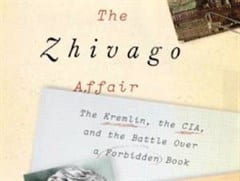
It is no secret that Boris Pasternak’s 1957 novel Dr. Zhivago influenced RPI Chairman and Founder Ron Paul. Indeed, Dr. Zhivago and Ayn Rand’s Atlas Shrugged are the only two works of fiction included in the list of 48 books at the end of Paul’s The Revolution: A Manifesto that Paul says influenced him over the years. What has long been a secret, though, is that the United States Central Intelligence Agency played a significant role in helping promote the Pasternak novel.
A peek at the influence Dr. Zhivago had on Paul may be found in ABC News and National Public Radio profiles of Paul from 2011 that report on how Paul reading in his 20s a copy of Dr. Zhivago that his mother had given him put Paul on course reading many other books that helped him develop his understanding of libertarian ideas. This reading led directly to Paul first running for Congress in 1974 and continuing to communicate regarding political topics to this day. As Paul has explained many times, his runs for political office have been motivated largely by a desire to share ideas related to freedom with a larger audience.
Might Paul’s mother not have given him Dr. Zhivago if the CIA had not boosted the book’s popularity? Without reading the book, may Paul not have proceeded in the study that led him to help build support for liberty and nonintervention in the US and abroad?
In their book The Zhivago Affair: The Kremlin, the CIA, and the Battle Over a Forbidden Book, authors Peter Finn and Petra Couvee report how the CIA played a significant role in boosting Dr. Zhivago’s popularity around the world. Interviewed by guest host Tom Gjelten on June 17 on the Diane Rehm Show, the authors explain that, after Pasternak’s novel was published first in Italian translation in Italy, the CIA obtained a copy of the book in the original Russian, published it, and facilitated its smuggling into the Soviet Union. Finn suggests in the interview that the smuggling of the book into the Soviet Union provided a significant boost to the book’s popularity:
Gjelten: So, Peter, you mentioned — this is the part that is really interesting to me — the book already was a bestseller before the CIA got involved, and, nevertheless, you write that in your judgment it would have had only a small elite readership…were it not for the fact that the Soviet Union got so upset about this. But, how do we know…one, what the reaction to this book would have been if the Soviet Union, the Soviet authorities had not gotten so upset; and, two, how do we know what the reaction would have been if the CIA had not gotten involved?
Finn: Well, on the first I think it is an educated guess. Russian literature — epic Russian literature — generally were not bestsellers at that time. And publishers love the word “banned” and, you know, this book was trumpeted in much of the news coverage as something that was banned in the USSR. And, therefore, people became intrigued. It was also an intellectual, sometimes difficult, book to read. But, the amount of coverage, the positive reviews led people to buy it in numbers they might not have. And the Soviet Union at various times did consider a small print run. If they had done that, we might have a different history today.
Later in the interview, Gjelten quotes from a July 9, 1958 memorandum by John Maury, the CIA Soviet Russia Division Chief, explaining the message of Dr. Zhivago:
Pasternak’s humanistic message — that every person is entitled to a private life and deserves respect as a human being, irrespective of the extent of his political loyalty or contribution to the state — poses a fundamental challenge to the Soviet ethic of sacrifice of the individual to the Communist system.
Paul and other discerning readers understood that this message applies beyond the borders of the Soviet Union as well.
It is interesting to ponder the possibility that this CIA covert operation may have helped start the extensive political education of one of the CIA’s most prominent opponents — Ron Paul, who has over several decades exposed the dangers the CIA poses.
In his September 19, 1984 US House of Representatives floor speech “Some Observations on Four Terms in Congress” Paul explained the unconstitutional use of the CIA to thwart the people’s will:
If covert aid to a nation is voted down, the CIA and the administration in power can find the means to finance whatever is desired. Emergencies are declared, finances are hidden, discretionary funds are found, foreign governments are used, and policy as desired is carried out, regardless of the will of the people expressed by Congress.
Upon returning to the House in 1997, Paul continued to shine a light on the CIA’s destructive activities, explaining in his House floor speech “America’s Foreign Policy” on July 15, 1997 that “[i]t is not a hidden fact that our own CIA follows our international corporate interests around the globe, engaging in corporate espionage and installing dictators when they serve these special interests.”
While unintended consequences of government actions are usually thought of as harmful, a CIA covert operation contributing to the emergence of Ron Paul’s political activity would be a noteworthy instance of an unintended and very positive consequence.

